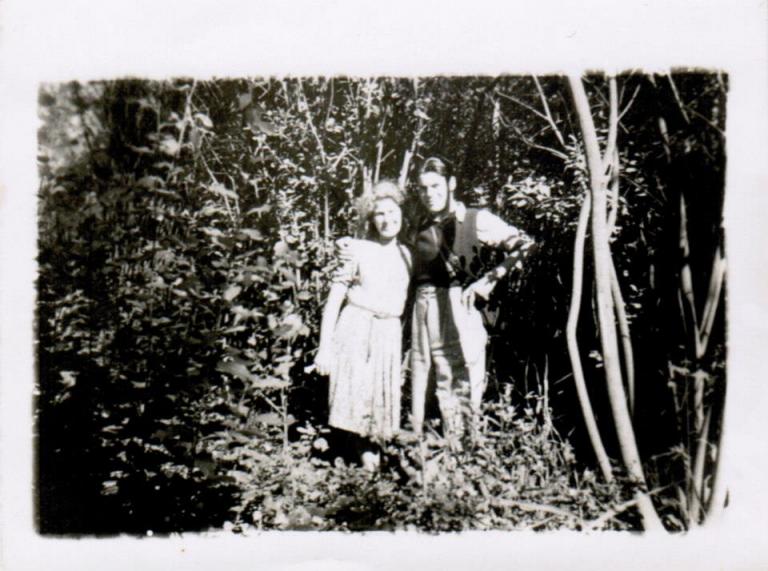I’d like to kick off my four weeks of fine men by telling you all a bit about two men whose ordinary choices shaped the family and world I was born into.
This is the story of the first of my two maternal grandfathers.
This is my grandmother, Anna van Bakelen, and her first husband, Jan Feddema.

While the setting for their romance may seem pretty dramatic to us–they fell in love and courted during the German occupation of the Netherlands–Anna and Jan were no different from many of their peers. Anna was a city girl whose mother owned a beauty salon in Amsterdam. Jan was a country kid from a farming family who learned a trade. They waited for the war to end and dreamed of the life they would build together.
When the war ended, Jan and Anna married and had a daughter–my mother. Soon afterward, Anna became pregnant again. Things were hard in the Netherlands during the post-war reconstruction era, and Jan and Anna were concerned about the opportunities their children would have. Some of Jan’s relatives had already emigrated to Canada, and when their second child–a son–was born, Jan and Anna decided to emigrate as well.
This is pretty much all I know about my maternal grandfather. Jan (Johannes) Feddema was a farm kid. He fell in love during a war, and waited faithfully for the day he could marry. He trained as a welder to be able to support his new family. He chose to move away from everything he knew to give his children a better life.
Aside from that, I have one story of my Opa Feddema. One day, after their move to Western Canada, while walking home to his wife after a long day of work, Opa Feddema spotted the evening light reflecting off something shiny in the trash. When he got home, he showed his bride his discovery–a glass saltshaker with a steel top.
When Oma told me the story, she couldn’t help but laugh. “He had to rescue it. He said, ‘Look at this! Stainless steel! This could last a hundred years, and someone just–pffff–threw it away like trash!’ So now whenever I think ‘I don’t need this old saltshaker, I should get rid of it,’ I remember what he said and then I can’t throw it out.”
Opa Feddema lived only a short while in Canada–long enough to see another son born–and then he died of a heart attack, or maybe a stroke.
Why start my “four weeks of fine men” with my Opa Feddema?
It seems like a lot of men have trouble choosing between the various possible paths in front of them. It’s hard to commit to any one course when you don’t know where it will lead. What we suffer now is not a paucity of choices, but paralysis in the face of too many choices. Every commitment to a course of study, a new hobby, a cause, a skill, or a woman makes the field of choices a little smaller. What if some other path would have been easier, more prosperous, richer, better?
And then some toxic forms of masculinity embrace passivity as a sort of petulant middle finger in the face of looming responsibility–I can’t be responsible for the consequences of the choices I refuse to make. There is always an excuse, a reason not to set a new direction or make a life-changing decision. Passivity feels safer.
But a life of meaning requires more.
Opa Feddema never knew where his decisions would lead. He fell in love during a war, when the very future of Europe was in question. He moved his family across the globe, not knowing what awaited them in Canada. He set the foundations for a life that he didn’t get to finish building. He lived a life of purpose and direction, and, from the stories and photos, a fair bit of gusto.
His choices–to dare to hope and plan in the midst of the darkness of war, to wait, to change everything to build the life he envisioned for his children–shaped his children’s futures, and through them, my own.
Opa Feddema didn’t live to raise his children to adulthood. He didn’t get to walk my mother down the aisle. He didn’t live to see where his choices would lead.
But he lived.
And his salt-shaker has a place of honor in my home.
After all, like his legacy, it could easily last a hundred years.












